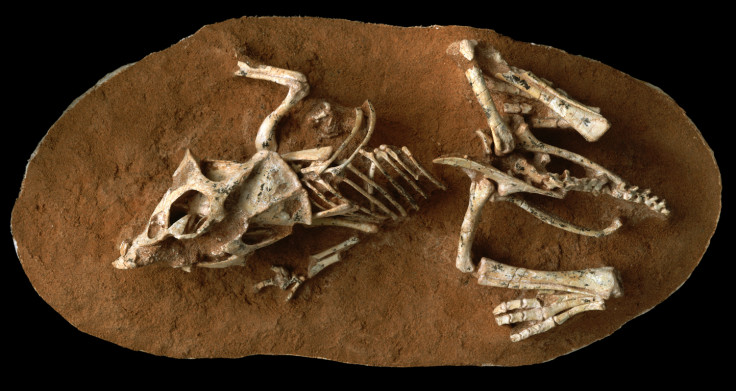Why did dinosaurs go extinct but birds survived? Answer revealed - in eggs
Dinosaurs were lumbered with an evolutionary 'dead man's hand' that birds escaped.
The reason that dinosaurs failed to survive the mass extinction event at the end of the Cretaceous period is the surprisingly long time their eggs took to hatch, new research has found.
Dinosaur eggs took up to six months to hatch, according to a paper published in the journal PNAS. That's twice as long as the longest bird incubation period. It had previously been assumed that dinosaur eggs would have taken roughly the same length of time as their close relatives the birds, as birds are a form of living dinosaur.
It turns out that this wasn't a safe assumption to make.
Teeth in an embryo in a fossilised egg
Dinosaurs are actually much more like modern-day reptiles, which incubate their eggs for longer. From studying fossilised dinosaur embryos, scientists have now found that a code for how long they had been alive is etched into the dinosaurs' teeth.

Dinosaur teeth are thought to undergo a daily process in common with mammals and reptiles: they laid down layers of enamel and dentine on a daily basis. With a new line formed each day, these act as tree-rings to determine the age of the embryo. The palaeontologists were able to age the dinosaur embryos in much the same way an orthodontic scientist would be able to age a human, from examining their teeth.
"Growth lines have a very distinctive look in the tooth," study author Gregory Erickson of Florida State University in the US told IBTimes UK.
"No other biorhythm known that creates a ring like that. To find markers like this, it's like having a time machine – we're looking back in time to see how old the embryos were."
The researchers extracted teeth from an embryo of a small, pig-sized dinosaur called Protoceratops, and a Hypacrosaurus, which was about 9 metres long and weighed roughly 4 tonnes. Protoceratops eggs weighed less than 200g, while hefty Hypacrosaurus eggs were closer to 4 kg.
Sluggish incubation spells extinction
The dinosaurs' downfall at the end of the Cretaceous period could have hinged on the long time that the eggs took to hatch.
"When you look at a cataclysm like this that basically knocked out all the resources in the planet, it becomes a very resource-limited environment," he says. "So dinosaurs were basically holding bad cards – a dead man's hand."

This hand consisted of their large size, the length of time they took to reach sexual maturity and the fact that they were probably warm-blooded and so wasteful with energy. When a long period of incubation for eggs is thrown in, the dinosaurs didn't stand a chance in the largely barren post-Cretaceous world, where nimbler and more efficient species came out on top.
"After an extinction like that the animals that have quick generation times are much more likely to fill ecological niches. They can quickly get more animals out there, with more chances for mutations," Erickson says.
"What survived was amphibians, lizards and whatnot – small cold-blooded animals that don't require a lot of energy to reproduce. Then mammals and birds – and they're inherently smaller than dinosaurs and have much more rapid generation time."
© Copyright IBTimes 2024. All rights reserved.







